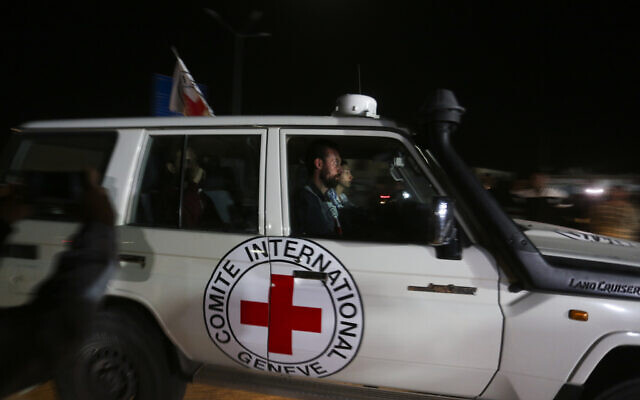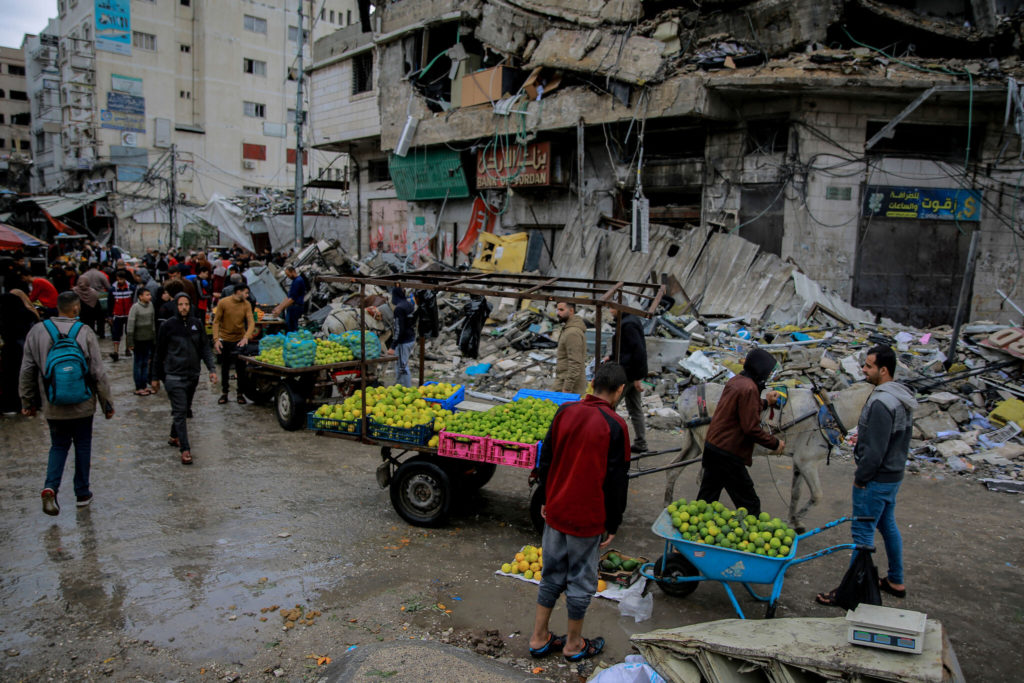Doha, Cairo broker deal to maintain pause, in move that is expected to see some 20 additional hostages, 60 Palestinian security prisoners released; Israel says extension ‘not final’, Time of Israel informs.
Qatar Foreign Ministry spokesman Majed Al-Ansari said on X on Monday evening that the sides had reached a deal to extend the pause for an additional two days.
The truce was being extended “in order to deliver additional aid into the Strip, and release the largest possible number of hostages and prisoners,” the ministry said.
A White House official confirmed the agreement, but there was no immediate word from Israel.
Later Monday evening, IDF spokesman Daniel Hagari said that an extension to the temporary ceasefire is not final: “We are managing a deal through mediators around the clock. Nothing is final until it actually happens,” he said. “Things are progressing, tonight as well, but patience is required.”
Qatar Foreign Ministry spokesman Majed Al-Ansari said on X on Monday evening that the sides had reached a deal to extend the pause for an additional two days.
The truce was being extended “in order to deliver additional aid into the Strip, and release the largest possible number of hostages and prisoners,” the ministry said.
The video player is currently playing an ad.A White House official confirmed the agreement, but there was no immediate word from Israel.
Later Monday evening, IDF spokesman Daniel Hagari said that an extension to the temporary ceasefire is not final: “We are managing a deal through mediators around the clock. Nothing is final until it actually happens,” he said. “Things are progressing, tonight as well, but patience is required.”
US National Security Council spokesman John Kirby said Hamas had agreed to release 20 hostages over the two days, and that efforts were underway to extend the pause further.

Hamas said in a statement that it had agreed to continue the halt in fighting, “with the same conditions as the previous truce.”
Under the initial truce agreement, which was set to expire Tuesday morning, Israel agreed to halt bombarding Gaza for four days, and said it would release three Palestinian security prisoners for each of 50 hostages freed from Gaza.
Since Friday, 39 Israelis and 117 Palestinians have been freed, with another 11 Israeli hostages and 33 Palestinians set to be released later Monday.
As a result of parallel negotiations led by Qatar, 17 Thais, one Filipino and one dual Russian-Israeli national have also been released by Hamas.
Egyptian officials earlier said a possible four-day extension was under discussion, but complicated by West Bank violence.
The news of the extension will likely bolster hopes for families of the approximately 175 Israelis and foreigners still held in Gaza, including Kfir Bibas, who was 9 months old when he was captured, along with his parents and 4-year-old brother from Kibbutz Nir Oz on October 7. That day saw Hamas terrorists stream into southern Israel, where they slaughtered some 1,200 people and took some 240 captive.

The extension agreement came hours after Israel appeared to balk at an initial list of hostages for Monday’s release, raising fears that the pact could be scuttled days after nearly falling apart on Saturday.
According to Kirby, US President Joe Biden discussed extending the pause in a phone call with Prime Minister Benjamin Netanyahu on Sunday.
Israel and Hamas agreed to extend a temporary truce in the Gaza Strip by two days on Monday, Qatar and the US confirmed, likely paving the way for the release of some 20 more people held hostage by the Palestinian terror group.
Qatar Foreign Ministry spokesman Majed Al-Ansari said on X on Monday evening that the sides had reached a deal to extend the pause for an additional two days.
The truce was being extended “in order to deliver additional aid into the Strip, and release the largest possible number of hostages and prisoners,” the ministry said.
1/2 Loading ad 2/2
Loading ad 2/2
The video player is currently playing an ad.
A White House official confirmed the agreement, but there was no immediate word from Israel.
Later Monday evening, IDF spokesman Daniel Hagari said that an extension to the temporary ceasefire is not final: “We are managing a deal through mediators around the clock. Nothing is final until it actually happens,” he said. “Things are progressing, tonight as well, but patience is required.”
US National Security Council spokesman John Kirby said Hamas had agreed to release 20 hostages over the two days, and that efforts were underway to extend the pause further.

Hamas said in a statement that it had agreed to continue the halt in fighting, “with the same conditions as the previous truce.”
Under the initial truce agreement, which was set to expire Tuesday morning, Israel agreed to halt bombarding Gaza for four days, and said it would release three Palestinian security prisoners for each of 50 hostages freed from Gaza.
Since Friday, 39 Israelis and 117 Palestinians have been freed, with another 11 Israeli hostages and 33 Palestinians set to be released later Monday.
As a result of parallel negotiations led by Qatar, 17 Thais, one Filipino and one dual Russian-Israeli national have also been released by Hamas.
Egyptian officials earlier said a possible four-day extension was under discussion, but complicated by West Bank violence.
The news of the extension will likely bolster hopes for families of the approximately 175 Israelis and foreigners still held in Gaza, including Kfir Bibas, who was 9 months old when he was captured, along with his parents and 4-year-old brother from Kibbutz Nir Oz on October 7. That day saw Hamas terrorists stream into southern Israel, where they slaughtered some 1,200 people and took some 240 captive.

The extension agreement came hours after Israel appeared to balk at an initial list of hostages for Monday’s release, raising fears that the pact could be scuttled days after nearly falling apart on Saturday.
According to Kirby, US President Joe Biden discussed extending the pause in a phone call with Prime Minister Benjamin Netanyahu on Sunday.
Israel has said it would be open to extending the calm so long as at least 10 hostages are released daily, and has indicated it may continue freeing Palestinian inmates.
However, Jerusalem has resisted calls from Qatar and elsewhere for a long-lasting ceasefire, with officials insisting that the military will eventually resume its punishing campaign aimed at toppling the Hamas terror group.
Israel will resume its operations with “full force” as soon as the current deal expires, if Hamas does not agree to further hostage releases, with the goal of eliminating the group and freeing the rest of the captives, government spokesperson Eylon Levy told reporters earlier Monday.

According to the UN, the truce made it possible to scale up the delivery of food, water and medicine to the largest volume since the start of the war. But the 160 to 200 trucks a day is still less than half what Gaza was importing before the fighting, even as humanitarian needs have soared.
Amani Taha, a widow and mother of three who fled northern Gaza to stay with a host family in the southern city of Rafah, said she had only managed to get one canned meal from a UN distribution center since the pause began.
She said the crowds have overwhelmed local markets and gas stations as people try to stock up on basics. “People were desperate and went out to buy whenever they could,” she said. “They are extremely worried that the war will return.”

